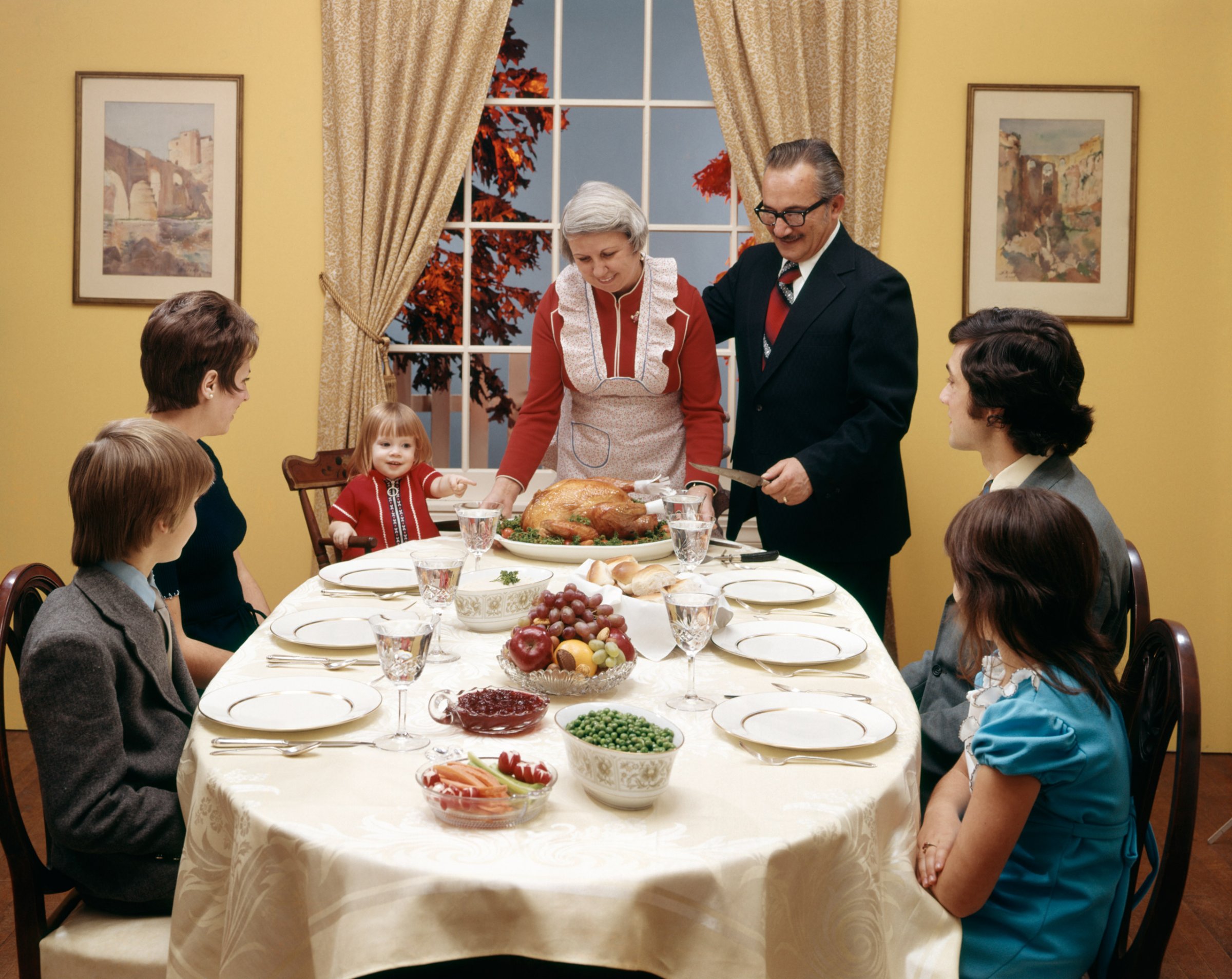
Our big national holiday is coming up. Time to get ready for Black Friday!
Oh wait, that should say Thanksgiving.
Apparently a lot of people get confused at this time of year. According to a new poll from the John Templeton Foundation, two-thirds of Americans associate Thanksgiving with buying stuff. Black Friday and CyberMonday get our hearts beating, and we’re willing to cut short Thanksgiving celebrations to get a good shopping deal.
There’s nothing wrong with a little consumerism—the economy needs it—but it’s striking how little “thanks” goes into “Thanksgiving.” When asked to describe their family traditions, 50 percent of Americans say they watch or play football on the holiday and 49 percent watch a parade. Sixty-six percent like to eat until they’re more stuffed than the turkey.
But express gratitude? That number is down at 36 percent.
Trying to up the gratitude quotient at Thanksgiving can lead to awkward moments. Some families ask everybody at the table to say what they’re grateful for –which results in a lot of rolled eyes, embarrassed glances, and mumbled comments about “my nice mother.” Gratitude through gritted teeth does not make the world—or the dinner table—a better place.
And there’s not much about the history of the holiday that leads to warm and cozy feelings, either. The storybook version holds that the Pilgrims and Native Americans came together for a harvest feast in 1620, joyous for all they had been given.
But the truth is that it had been a rotten year for everybody. More than half the 102 Pilgrims who arrived on the Mayflower had died in the first brutal winter. The first harvest wasn’t so great, either—the sun had parched the peas and the barley was lousy. Those who survived would have had every right to gather for a pity party rather than a day of gratitude.
It took some 250 years after that for Thanksgiving to become a national holiday. And ironically, there’s nothing particularly American about it. The Canadian Thanksgiving has a similar story of a miserable voyage and ultimate hope. English thanksgiving celebrations date back to the 1500s and in other cultures, even earlier.
So maybe there is a human instinct to stop and appreciate what we have, however good or bad the circumstances. Gratitude doesn’t have to be soft and sappy—it’s a game we play with ourselves and our kids to get through times good and bad. It changes how we view the world, and how we view ourselves.
When your flight is delayed this Wednesday, you can get upset, or you can do what psychologists recommend and try to reframe the event. How can you find some good in the moment? Let yourself feel lucky that you’re sitting next to your spouse and can cuddle and talk. Or that you have an excuse to eat pretzels. Or remind yourself that yes it’s cramped, but for goodness sakes, you’re on a plane. The Pilgrims who took 66 days to cross the ocean in rough seas and miserable weather would be very happy to take your middle seat.
Being grateful lowers your blood pressure, decreases stress, and lowers depression—results that we can all use at this time of year. And when you’re feeling grateful, you’re also more giving. Generosity has positive effects on the world—and on our happiness, too. In the Templeton survey, more than half the people who regularly donated money said they were happy and satisfied with their lives. Only 33 percent of people who didn’t give were similarly content.
Gratitude seems to create a circle of goodness. When you let yourself be grateful for what you have (at whatever level), you want to give to others. And the giving makes you more grateful.
“Giving isn’t just about money, its essence is gratitude and caring,” says Henry Timms, executive director of the 92Y, who launched the Giving Tuesday movement a few years ago. He now calls it a “global day dedicated to giving back.”
So maybe the best way to bring gratitude into the holiday this year is to join together the thanks and the giving. Do something that matters—and it doesn’t have to be volunteering at a soup kitchen. Write a letter of gratitude to someone who has helped you. Say thanks to the people who work for you. Express gratitude to the person who doesn’t usually hear it.
Black Friday and Cyber Monday are with us and not going away—and Henry Timms doesn’t even object to that. “Buying is for the economy but giving is for the soul,” he says.
So eat the turkey, watch football, and search for the great deal online. But if those leave you groggy and grumpy, don’t worry. You have a whole season ahead to be grateful and giving.
You can make your own Thanksgiving any day, with or without cranberry sauce.
Janice Kaplan is the author of the New York Times bestseller The Gratitude Diaries: How A Year Looking On the Bright Side Can Transform Your Life.
More Must-Reads from TIME
- Donald Trump Is TIME's 2024 Person of the Year
- Why We Chose Trump as Person of the Year
- Is Intermittent Fasting Good or Bad for You?
- The 100 Must-Read Books of 2024
- The 20 Best Christmas TV Episodes
- Column: If Optimism Feels Ridiculous Now, Try Hope
- The Future of Climate Action Is Trade Policy
- Merle Bombardieri Is Helping People Make the Baby Decision
Contact us at letters@time.com